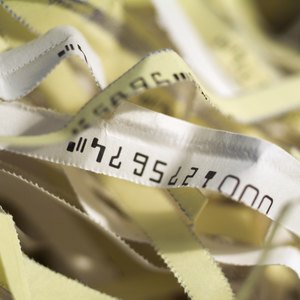
Your bank account number plus the bank's routing number – the numbers listed on the bottom of your checks – can be used to set up electronic deposits or withdrawals from your account. With these types of transactions expected to reach 726 billion by 2020, you will probably give your account information to more than a few businesses or individuals to authorize transactions in one direction or the other. However, your bank account information can also be used for fraud, so take the appropriate steps to protect yourself.
ACH or Electronic Transfers
Electronic bank deposits and transfers are handled by the Automated Clearing House system. If you have your paycheck directly deposited into your bank account, the deposit is an ACH transaction. You can make automatic payments such as for insurance or your health club with ACH debits from your account. Setting up an ACH transaction requires just the account number and bank routing number for your account. Legally, you must authorize any ACH transaction in or out of your bank account.
Potential For Fraud
It is possible for someone to set up ACH withdrawals from your account if he has the account and routing numbers. ACH fraud is big business, but it mostly targets commercial bank accounts. Bank fraud is often accomplished through email spam messages that download spyware software onto a computer to collect keystroke data such as bank accounts. Care should be taken when giving out your bank information and you should not provide your bank account information in response to email requests.
Read More: 5 Automatic Savings Apps to Help You in 2020
Protect Yourself By Account Review
You should only authorize ACH withdrawals from your account through a written form or via the secure webpage of a company with whom you are familiar or have an established relationship. Consumer protection laws such as the Electronic Fund Transfer Act give you 60 days to dispute a fraudulent ACH withdrawal and recover the money. You should check your bank statement every month and make sure you've authorized any electronic payments. If you see a withdrawal you did not authorize, immediately contact your bank with the details.
Business Bank Accounts
Commercial bank accounts are not covered under the 60-day rule to report fraud. The owner of a business bank account has only 24 hours to detect and report a fraudulent ACH withdrawal. With a business account either the transactions must be reviewed daily or some sort of ACH filter can be used to electronically monitor transactions for possible fraud. Banks offer different types of ACH filtering tools to their commercial customers.
Read More: How to Get a Secured Credit Card
References
Writer Bio
Tim Plaehn has been writing financial, investment and trading articles and blogs since 2007. His work has appeared online at Seeking Alpha, Marketwatch.com and various other websites. Plaehn has a bachelor's degree in mathematics from the U.S. Air Force Academy.

